
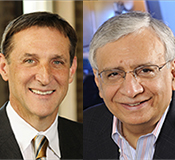 |
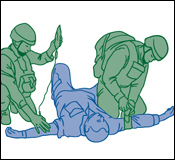 |
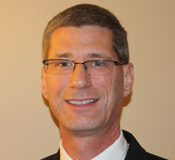 |
 |
Annual external research funding total again exceeds $500 million
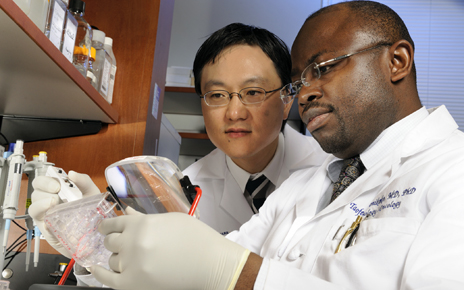 |
| Pathologist Gabriel Sica with oncologist Taofeek Owonikoko, who is studying a class of drugs for treating lung cancer. |
Researchers throughout Emory University garnered external research awards totaling approximately $521.8 million in fiscal year 2013-2014, a 2.56% increase over last fiscal year. This marks the fifth consecutive year that research funding has exceeded $500 million.
The research total for health sciences was approximately $482.9 million, compared with last year's total of $474.4 million. The total for FY 14 breaks down among units as follows:
• Medicine, $320,674,323
• Nursing, $12,258,936
• Public Health, $73,029,740
• Yerkes, $73,369,731
• Exec VP, Health Affairs, $3,664,244
"In view of the nation's continued budget constraints on research and development funding, these totals are especially remarkable," says David Stephens, WHSC VP for research and chair of the medical school's Department of Medicine. "They are truly a testament to the high quality of our researchers' grant proposals and their potential and relevance to benefit society."
Many of these FY 14 grant awards pertain to work in infectious disease. Emory's designation was renewed, for example, as one of the nation's nine NIH-sponsored Vaccine and Treatment Evaluation Units, which together are receiving contracts worth up to $135 million annually over seven years. In partnership with University of Georgia, Emory received a contract to fund the Emory-UGA Center of Excellence for Influenza Research and Surveillance, with potential funding of $26.7 million over seven years. The Emory-CDC HIV/AIDS Clinical Trials Unit (CTU) received renewal of a seven-year NIH CTU designation, with expected core funding of more than $12.7 million. Yerkes received a $3.3 million four-year award from NIH to study functional genomics of HIV infection. And Rollins School of Public Health received $2.3 million from the National Science Foundation to study waterborne disease risks.
Other awards last year included more than half of a $12 million NIH four-year award to study genetics of schizophrenia and a $7.2 million five-year award from NIH to lead an Alzheimer's proteomics project.
Larsen and Ahmed elected to IOM
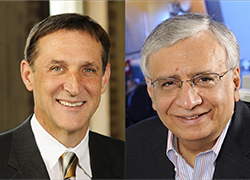 |
| Chris Larsen and Rafi Ahmed |
The Institute of Medicine (IOM) has elected Rafi Ahmed and Chris Larsen to its new class of 70 leading health scientists and 10 foreign associates.
Ahmed is director of the Emory Vaccine Center, a Georgia Research Alliance Eminent Scholar, a Yerkes scientist, and Charles Howard Candler Professor of Microbiology and Immunology in the medical school.
Larsen is dean of the medical school, VP for Health Center Integration in the Woodruff Health Sciences Center, chair of the Board of Directors of the Emory Clinic, and Emory Healthcare Physician Group President. He is also professor of surgery in the medical school and an affiliate scientist at Yerkes.
Election to the IOM is one of the highest honors in the fields of health and medicine and recognizes those who have made major contributions to advancing medical sciences, health care, and public health.
"Rafi Ahmed and Chris Larsen have dedicated their careers to saving lives through their groundbreaking discoveries in immunology, vaccine and drug development, infectious diseases, and transplantation," says EVPHA Wright Caughman. "And their institutional vision has played a significant role in Emory's national leadership in health sciences education, research, and patient care."
As fellow immunologists, Ahmed and Larsen have collaborated on long-term research projects aimed at refining and targeting the immune response in animals and humans to fight infectious diseases and cancer and to improve organ and tissue transplantation. Read more.
See a full list of Emory's IOM members.
Adapting lessons of war to civilian care
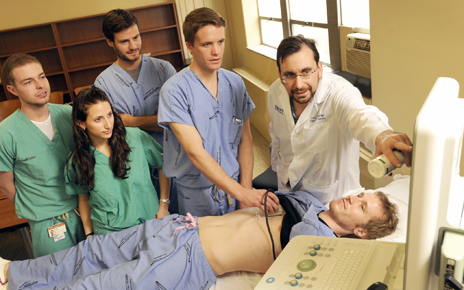 |
| Trauma surgeon Christopher Dente (white coat) is the partnership's lead site investigator at Grady. |
Emory is the initial civilian site in the multi-institutional Surgical Critical Care Initiative (SC2i), sponsored by the Department of Defense (DoD) to translate advances in combat casualty care to civilian practice.
One of the by-products of recent armed conflicts is an increase in survivability of catastrophic injuries, thanks to new types of body armor and far-forward deployment of advanced medical resources. However, no established precedents exist for caring for such complex and life-threatening injuries. In an effort to standardize care in these extreme circumstances and control variable outcomes and costs, the DoD developed biomarker panels and decision-making algorithms that corresponded to different types of severe injuries. The goal of the SC2i is to validate, enhance, and adapt these tools to treat critical injuries and illnesses in civilian settings and transmit data back to the DoD to further refine its battlefield procedures.
Much of the Emory-based work will be done by Tim Buchman, director of the Emory Critical Care Center, and Christopher Dente, associate director of trauma at Grady Hospital and the partnership's lead site investigator at Grady. Both Buchman and Dente have extensive clinical and research experience in trauma and surgical critical care and lead the types of clinical services that can directly apply and evaluate the DoD's systems. Former Emory transplant surgeon Allan Kirk (now at Duke) oversees SC2i's civilian investigative partnerships.
The SC2i will integrate and analyze massive amounts of information, including immune-related data from biological samples acquired in real-time settings, such as Emory and Duke's trauma centers and ICUs. The clinical teams will work with DecisionQ, a private company that specializes in data mining and creating mathematical predictive models to design a system that will pair multiple data streams with the DoD's decision-making algorithms so that clinical professionals can receive informed recommendations for specific patient scenarios.
In addition to trauma and critical care, the decision-making tools that will be validated and enhanced by the SC2i are expected to help optimize outcomes across other disciplines that require complex medical decision making, including emergency medicine, orthopaedics, transplantation, and oncology.—Sean Moore
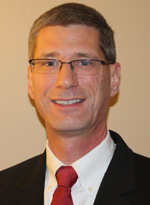 |
Darryl Stanley has witnessed many changes at Yerkes National Primate Research Center over the past 25 years. When he first started there, he had three staff members, and parking was limited to a few spaces in front of the building and some less clearly delineated ones on the hillside nearby.
Today, he has a staff of 30, and Yerkes not only has its own parking deck but its own shuttle that runs every 20 minutes to transport researchers back and forth to other buildings on campus.
Stanley and his staff are responsible for maintaining all of Yerkes's facilities, both on campus and at the field station in Lawrenceville. The main center alone has 29 structures, including the 22,000-square-foot Dual-Function Facility that opened last year (accommodating studies of highly infectious diseases such as TB and yellow fever and research for transplant medicine).
"Yerkes is such a dynamic place," says Stanley, who began his career in facilities management at Georgia State University. "It's grown tremendously in buildings, infrastructure, and programs. Whenever you get a glimpse into the work that's done here—the science, the animals—that's what keeps me here."
"The animals here are totally dependent on us," he adds. "It's a big responsibility to make sure that we provide the right environment for their health and safety, for the researchers who depend on those animals to make scientific discoveries, and for the students who are getting their PhDs."
No two days are the same for Stanley and his staff. In addition to routine work orders, recent projects have included installation of a new perimeter fence at the 115-acre field station and a final inspection of the Dual Function Facility's systems and structure before expiration of the one-year construction warranty.
Whenever a researcher has an idea for a new piece of equipment, staff in the fabrication shop build a prototype and tweak it as needed. The shop also repairs and customizes cages for animal enrichment. Because of the nature of Yerkes's work, a maintenance mechanic remains on duty 24/7, 365 days a year, to troubleshoot problems, such as when a freezer alarm sounds in a laboratory.
"These types of incidents require immediate attention," Stanley explains. "The freezers hold the life's work of our researchers. We either take care of the problem right away or call the principal investigator to come and move the samples to another freezer until we can resolve it."
More than 500 people work at the Yerkes central campus and field station. That number can balloon to 600 when collaborators and students are present. The main center houses 1,200 monkeys and chimpanzees and 10,000 rodents, while the field station has 1,800 monkeys and chimps.
"It's very collaborative here," says Stanley of the Yerkes culture. "It still has a family feel. Here you will find the biggest lovers of animals. There is a real sense of duty and respect for them."
Stanley recently became part of a new era. By the time new Yerkes director Paul Johnson arrived from the New England Primate Research Center in August, Stanley had served four leaders of Yerkes—the late Fred King (1978-1994), Thomas Insel (1994-1999), Tom Gordon (1999-2001), and Stuart Zola (2001-2014).
"It's exciting to see new leadership and how it changes our direction and focus," says Stanley. "As a professional in facilities management, I can't imagine doing this any place else."—Pam Auchmutey
New organizational structure positions Emory to lead in changing health care landscape
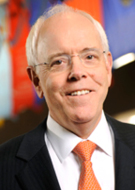 |
|
| Wright Caughman |
The environment for academic medicine and health care is changing rapidly and continuously. To better position Emory for the opportunities in this new environment, we have instituted several changes in the executive leadership structure of Emory Healthcare (EHC).
Effective this month, Dane Peterson has assumed the position of EHC Hospital President. In this newly defined role, Dane now has responsibility for the overall performance of all of our Emory hospitals, with each hospital CEO reporting to him as we move to enterprise-wide coordination of care and resources. Dan Owens will serve as interim CEO at Emory University Hospital Midtown as Dane steps into his new leadership role.
Separate from, and in addition to, his role as Dean of the School of Medicine, Chris Larsen has been appointed to the new position of EHC Physician Group President. In this new role, Chris has responsibility for physician management, performance, and engagement across EHC, with the leadership of the Emory Clinic and employed community practices reporting to him. As the new EHC Physician Group President, Chris is reporting to EHC CEO and President John Fox. As Dean of the School of Medicine, Chris continues reporting to me as EVP for Health Affairs and to Claire Sterk as Provost.
Finally, during this interim period until our next EVPHA has arrived, Mike Mandl, Emory’s EVP for Business and Administration, is serving as Chair of the Emory Healthcare Board of Directors. I continue to serve as a member of the EHC Board. Mike brings to this role not only superb business acumen but also an equally important long-standing engagement with the EHC Board, a deep commitment to our academic and health care missions, and years of experience working with me, Chris Larsen, John Fox, and Emory’s Board of Trustees. He and I will continue our close working relationship throughout the search for the new EVPHA.
With any time of change comes great challenge as well as great opportunity. We at Emory are truly fortunate that we have leaders such as Dane, Chris, and Mike to assume these roles. Please join me in congratulations and great thanks to all three, and thanks as always to all of you.
Please direct questions and comments to evphafeedback@emory.edu.
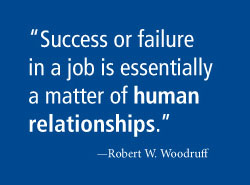 |
Rollins Foundation gives $10 million to RSPH endowment
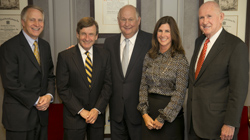 |
| L to R: President Wagner and Dean James Curran with Gary Rollins, Amy Rollins Kreisler, and Randall Rollins. |
A recent $10 million gift from the O. Wayne Rollins Foundation will double the O. Wayne and Grace Crum Rollins Endowment Fund at the Rollins School of Public Health. Established in 1997, this unrestricted endowment provides support for the school's highest priorities, including recruiting and retaining key faculty leaders. The Rollins family's commitment to public health has enabled the school to build the Grace Crum Rollins and the Claudia Nance Rollins buildings.
Emory Healthcare launches protocols website for Ebola
 |
Emory Healthcare has launched an external website that will serve as a resource for health care organizations regarding best practices for safe and effective screening, diagnosis, and treatment for patients with Ebola virus disease. Read more.
Winship 5K raises > $600,000
 |
The fourth annual Winship Win the Fight 5K on Sept. 27 drew more participants and raised more funds (more than $600,000) than in any previous year. More info.
Appointments
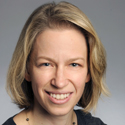 |
Infectious disease specialist Wendy Armstrong has been named vice chair of education and integration in the medical school's Department of Medicine, effective Dec. 1. She will lead departmental education initiatives as well as integrate research and care into educational efforts.
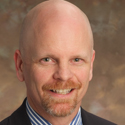 |
Ted Johnson has been named physician director of Emory Medicine Primary Care and Population Health and chair of the Department of Family and Preventive Medicine in the medical school, effective Nov. 1. In the latter role, he replaces Interim Chair Kate Heilpern.
Bill Bornstein (EHC chief medical and quality officer) and Susan Grant (EHC chief nurse executive) are among 13 members appointed by Gov. Nathan Deal to a statewide Ebola response team. Read more.
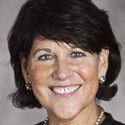 |
Mary Kozik has been named senior director of development for Winship Cancer Institute. She comes to Emory from the Preservation Society in Newport, RI. She replaces Vicki Riedel, who will oversee principal gifts for the WHSC. Read more.
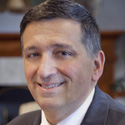 |
John Worth has been appointed associate dean in nursing for finance and administration. He comes to Emory from University of Pittsburgh's Department of Medicine. Read more.
Notable
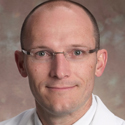 |
Bryce Gartland, VP of operations at EUH, has been named one of Modern Healthcare's Up & Comers for 2014. Read more.
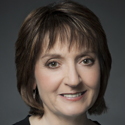 |
Helen Mayberg, will be the 2015 recipient of the Paul D. MacLean Award for Outstanding Neuroscience Research in Psychosomatic Medicine.
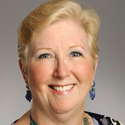 |
Barbara Pettitt, received the 2014 Olga Jonasson Distinguished Member Award from the Association of Women's Surgeons Foundation. Read more.
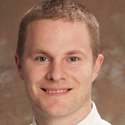 |
Sean Stowell, received the NIH Director's Early Independence Award. These awards, which include five-year research grants of $1.25 million, are given to a small number of exceptional early-career scientists who demonstrate "the intellect, scientific creativity, drive, and maturity to flourish independently without the need for traditional postdoctoral training," according to NIH director Francis Collins. Read more.
Events
Oct. 26: As part of Fernbank Museum of Natural History's current "Goose Bumps!" exhibit, Yerkes scientist Kerry Ressler will give a lecture, The Science of Fear: From Mice to Men, at 4:00 p.m. More info.
Oct. 29: Emory Medicine 2015. Address by Dean Christian Larsen, 4:30 p.m., WHSCAB Auditorium. Reception to follow.
Oct. 31: 2014 EHC Quality Conference. 8-noon, Cox Hall. More info.
Nov. 6: Spiritual Health Grand Rounds: More than our bodies: Whole person health in World B. Trace Haythorn. 12:30 to 1:30, EUH Auditorium and satellite venues. More info.
Nov. 13: Schwartz Center Rounds: When patients have unexpected results. Lunch, 11:45. Lecture: 12-1:00 p.m. SOM room 110. RSVP by Oct. 31. More info.
